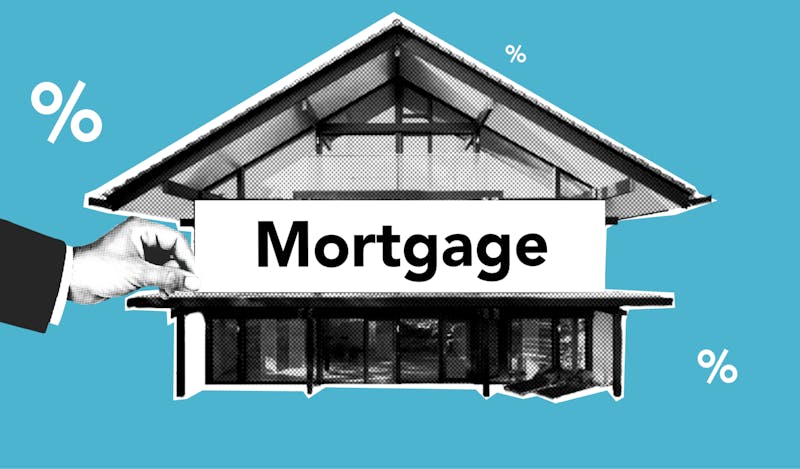As we navigate through the complex terrain of Ontario’s housing market, one important question frequently emerges: are mortgage rates going down in Ontario? This question not only resonates with current and prospective homeowners but also shows the broader economic uncertainties permeating the Canadian landscape.
This blog will answer this question, using recent financial developments and forecasts to offer an in-depth analysis.
Factors Influencing Mortgage Rates
Mortgage rates in Ontario, and more broadly across Canada, are shaped by a complex interplay of both domestic and international forces. Here’s a breakdown of the key factors at play:
- Bank of Canada’s Policy Rate
The central bank’s policy rate directly impacts lenders’ prime rates, which in turn influences variable mortgage rates. Adjustments in this rate can lead to corresponding changes in mortgage rates. - Inflation
A significant determinant of mortgage rates. Higher inflation often leads to higher mortgage rates as lenders aim to secure real returns on their loans. - Employment Rates
The health of the job market is a critical factor. A robust job market can push mortgage rates upward as more individuals are financially positioned to purchase homes, boosting demand for mortgages. - International Events
Changes in the U.S. Federal Reserve’s interest rates or global economic uncertainties can indirectly affect Canadian mortgage rates, highlighting the global interconnectedness of financial markets. - Global Economic Trends
Broader economic trends beyond Canadian borders can influence investor confidence and capital flows, affecting the cost of borrowing and lending rates, including those for mortgages.Trends in Mortgage Rates
In recent years, Ontario has experienced a period of relatively low mortgage rates, spurred by the Bank of Canada’s efforts to stimulate the economy during challenging times However, this trend has shown signs of reversal as the economy begins to recover.
In its latest pronouncement, the Bank of Canada opted to maintain the status quo, preserving the policy rate at a solid 5.00%. This decision underscores a cautious approach, balancing the dual objectives of economic stabilization and inflation control. The influence of rate adjustments on the economy is profound, yet gradual, typically manifesting fully over a year.
As we stand after 21 months of consecutive interest rate hikes — totalling 10 in number — the Canadian economy is now beginning to absorb the cumulative impact of these decisions. This strategic patience from the Bank of Canada highlights its commitment to steering the economy towards a balanced growth path.
The Impending Challenge for Ontario Homeowners
The timing of these economic shifts is particularly important for Ontario’s real estate market. With nearly half of all Canadian mortgages — amounting to about 2.2 million — approaching renewal within the next two years, homeowners are bracing for the reality of heightened interest expenses. This imminent financial strain highlights the urgency in answering: are mortgage rates going down in Ontario? The ensuing months are therefore significant, as they may determine the financial well-being of countless Ontario homeowners.
Current Mortgage Rates and Economic Indicators
Right now, the prime rate is at 7.20%. This shows how the current economic plan is trying to control inflation, which is at 2.8%. The direction mortgage rates are heading, especially in a busy market like Ontario, closely follows these big economic indicators. So, when people wonder if mortgage rates will drop, it’s not just hopeful thinking. It’s based on predictions about the economy.
The conversation is moving towards when we might see mortgage rates go down in Canada, hinting at what might happen in specific areas like provinces. This connection between the prime rate and inflation highlights the tricky challenges that both policymakers and homeowners face.
Forecasting the 2024 Mortgage Rate Landscape in Ontario
The anticipation surrounding mortgage rates in Ontario, particularly regarding whether they will decrease by 2024, is mounting. Some predict a continued rise in rates as the economy strengthens and inflation remains above target levels. This scenario is likely if the Bank of Canada continues to increase its policy rate to combat inflation. Conversely, should there be significant economic setbacks or a shift towards a more accommodative monetary policy, we could see a stabilization or even a decrease in mortgage rates. It’s also important to consider upcoming economic policies and global events, such as trade negotiations or geopolitical tensions, which could influence the direction of rates.
Some projections suggest a mid-2024 timeframe for the initiation of this downward trend, with expectations set between a 25 to 50 basis point reduction, eventually leading to a more substantial decrease by the year’s end.
These forecasts, emerging from the analyses conducted by Canada’s Big 6 Banks, provide a glimmer of hope for those querying: will mortgage rates go down in 2024 in Ontario? Such projections offer a silver lining, indicating a potential easing of the financial pressures faced by many in the housing market.
Strategic Considerations for Ontario Homebuyers and Homeowners
In this financial milieu, finding the best mortgage rate in Ontario becomes important. For those navigating the housing market, understanding what is the best mortgage rate in Ontario and how to secure it amidst fluctuating rates is crucial. Similarly, awareness about the average mortgage in Ontario aids in benchmarking and making informed decisions. Equipped with this knowledge, prospective buyers and current homeowners can better strategize their financial planning, ensuring they are prepared for whatever direction the mortgage rates may take.
Examining the mortgage rate landscape in Ontario highlights the intricate relationship between global trends and economic considerations, which highlights the complex topic of whether mortgage rates in Ontario will go down. Our investigation sheds light on the crucial factors influencing these rates, such as changes in global economic conditions and central bank policy, and reflects the larger uncertainty affecting Canada’s economy.
Expert predictions and recent trends point to cautious optimism, with rates likely to decline in the upcoming months due to policy changes and economic recovery. For Ontario’s homebuyers and homeowners, this is a significant time since navigating the coming uncertainties will require a combination of financial strategy and market knowledge.
FAQs
1. Will mortgage rates decrease in Ontario by 2024?
Projections suggest a cautious optimism for a potential decrease by mid-2024, with a 25 to 50 basis point reduction expected, possibly leading to more significant decreases by year-end, dependent on economic and policy shifts.
2. When are mortgage rates expected to drop in Canada?
A decrease in mortgage rates across Canada, including Ontario, is anticipated possibly in 2024, subject to the Bank of Canada’s decisions, inflation trends, and global economic conditions.
3. What’s the average mortgage rate in Ontario?
Average mortgage rates vary by mortgage type, term, and whether they are fixed or variable. Currently, prime rates are at 7.20%, but rates fluctuate, so it’s best to consult with financial institutions for the latest rates.
4. How does the Bank of Canada’s policy rate influence Ontario’s mortgage rates?
The policy rate affects lenders’ prime rates, influencing variable mortgage rates. Changes in this rate are used to control inflation and stabilize the economy, directly impacting borrowing costs.
5. What should be considered when seeking the best mortgage rate in Ontario?
Consider the mortgage type (fixed vs. variable), term length, payment options, and any penalties for early repayment. Comparing offers and consulting with a mortgage broker can also be beneficial.
6. Can international events impact Ontario’s mortgage rates?
Yes, global events like changes in U.S. interest rates or economic crises can indirectly affect Canadian rates through their impact on global markets and economic growth, showing the global-domestic economic linkage.



